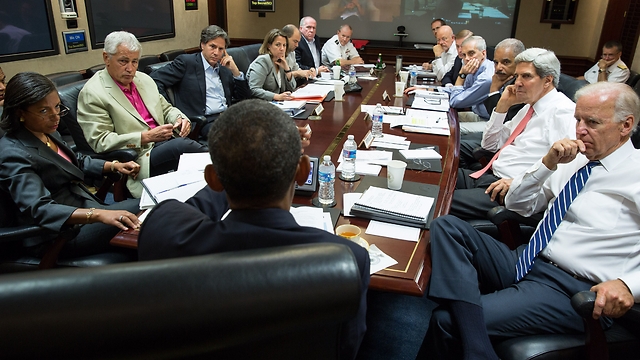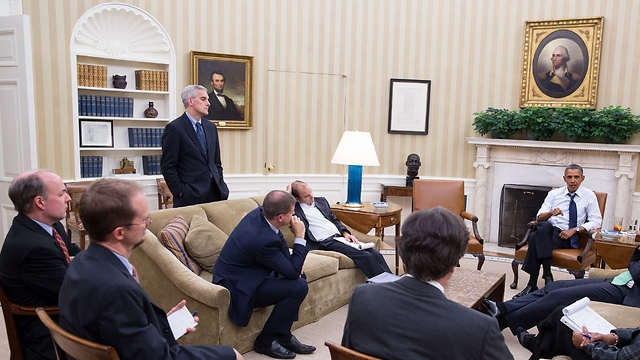
Report: Obama's last minute decision was made alone
Wall Street Journal reveals drama behind the scenes: US president decided to seek congressional approval for Syria strike late Friday night, following remark from Dempsey, consultation with chief of staff
After a 45-minute walk Friday night, President Barack Obama made a fateful decision to seek congressional authorization before taking military action in Syria, the Wall Street Journal reported. On his mind was General Martin Dempsey's assertion that an attack would not be time sensitive and some input from his own chief of staff Dennis McDonough.
According to the report, aides said the decision was made by Obama alone. Until Friday night, Obama's national-security team didn't even have an option on the table to seek a congressional authorization.
The only real discussion was a plan to punish Syrian President Bashar Assad for what the chemical-weapons attack, the report said.
Related stories:
- British PM backs Obama position on Syria
- Op-ed: Obama blinked first
- Obama seeking congressional OK for Syria action
The final question, policy makers thought, was how many targets to hit and when to tell the Navy destroyers in the eastern Mediterranean to open fire.
However, Obama made no secret to aides he felt uncomfortable acting without UN Security Council backing. Current and former officials said his decision reflected his concerns about being seen as acting unilaterally—without political cover from Congress and without the UK at his side. Arab states offered little public support despite their private encouragement.
According to the report, the change in Obama's thinking confounded White House insiders. Some raised concerns about the decision. They asked what would happen if Congress refused to authorize using force, a senior administration official said.
It was further noted that the move took key allies from Israel to Saudi Arabia by surprise. They thought Obama was about to pull the trigger and were preparing for possible retaliation from Assad.
One official said the biggest concern for the Middle Eastern allies was that the passage of time during the congressional debate would reduce the sense of urgency for action.
According to the report, one remark left a particular impression on Obama. During one of the meetings, Gen. Martin Dempsey, the chairman of the Joint Chiefs of Staff said the timing of a strike didn't matter.
Whether strikes were launched tomorrow, or a week from now, or a month from now, the military would be able to ensure the effectiveness of the operation, Dempsey explained. This was mentioned in Obama's speech.
Until Friday night, Obama's national-security team was focused on only consulting Congress, rather than seeking a vote on an authorization to use force.
During his daily wrap-up meeting with Chief of Staff Denis McDonough, Obama and Dennis McDonough went on a 45-minute walk around the White House grounds.
During the walk, Obama told McDonough his thinking—that consulting with Congress wasn't enough—lawmakers should have to go on the record one way or the other. McDonough in his previous role as deputy national security adviser emerged as a leading voice of caution against intervening in Syria.
At 7 pm Friday, Obama called his top aides into his office, including National Security Adviser Susan Rice, to inform them of his plans, the WSJ reported. Aides say Obama came up with the idea himself to seek an authorization.
According to the report, many insiders were stunned because of the risk Congress will say "no." "You have to win the vote. You have to win," one senior administration official said after the decision was disclosed. "If Congress doesn't let him act, the consequences for him and for the country's standing in the world are enormous."
Later Friday night, Obama told aides the decision reflected his growing frustration with lawmakers who appeared to want to have it both ways—criticizing the president for not seeking congressional authorization, and then criticizing the decisions he makes.
- Receive Ynetnews updates directly to your desktop













